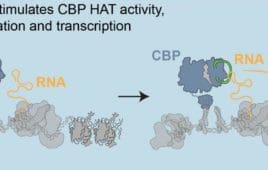
Gene-Editing Reduces Triglycerides, Cholesterol by Up to 50 Percent, Finds Penn Animal Study
Using a variation of CRISPR gene editing may be a potential strategy for mimicking the protective effects of a genetic mutation linked to lower cholesterol levels and heart disease risks, according to new mouse research from the Perelman School of Medicine at the University of Pennsylvania published this week in Circulation. People with naturally occurring…
Investigational Personalized Cellular Therapy Combined with Ibrutinib Can Lead to Remission in Leukemia Patients
Vaccine Triggers Immune Response in Head and Neck Cancer Therapy
Researchers: Basic Biology of Pain Reveals Non-Addictive Remedies
‘Mysterious’ Non-Protein-Coding RNAs Play Important Roles in Gene Expression
In cells, DNA is transcribed into RNAs that provide the molecular recipe for cells to make proteins. Most of the genome is transcribed into RNA, but only a small proportion of RNAs are actually from the protein-coding regions of the genome. “Why are the non-coding regions transcribed at all? Their function has been mysterious,” said…





